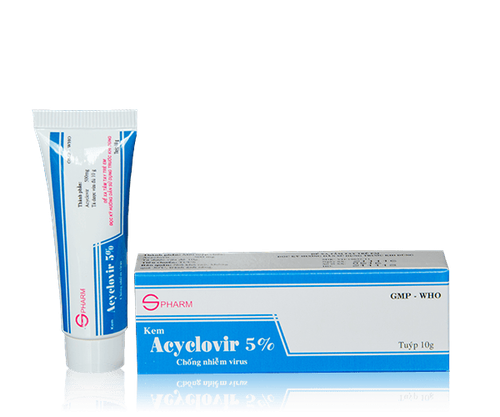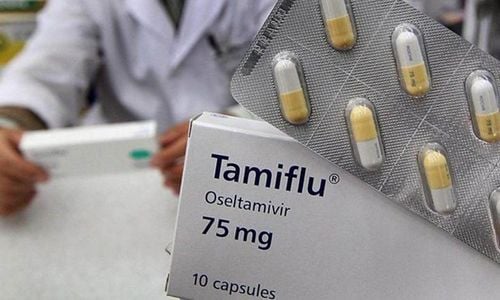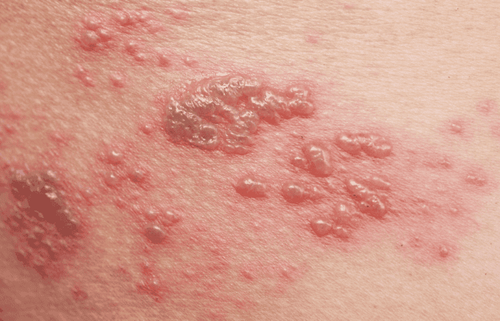This is an automatically translated article.
Anyone who has had chickenpox is at risk for shingles, including pregnant women. Although there is no specific treatment, the doctor will prescribe some medications to help relieve uncomfortable symptoms and shorten the duration of the disease. The following article helps readers learn what types of shingles treatment drugs for pregnant women include and what to note when using.
1. What is shingles?
Shingles is the result of the reactivation of varicella zoster, the virus that causes chickenpox. People with chickenpox, after healing, the virus still does not go away completely. These viruses will be inactive and reside in nerve cells, nerve ganglia. When meeting favorable conditions such as immunodeficiency (due to chemotherapy, AIDS, ...), nervous stress, body weakness... the virus will be reactivated, causing inflammation of the skin and nerves. nerve, called shingles.
Symptoms of shingles are a persistent pain, itching, tightness, burning, stinging sensation on the skin on one side of the body. A few days after the pain appears, the rash will appear, red, bulging into blisters at the site of pain. After the blisters burst, they begin to scab over and heal. The entire shingles flare-up from onset to healing usually takes 3-4 weeks. Along with a skin rash, some people may experience fever, headache, nausea, and chills.
Shingles occurs most commonly in people over 60 years of age. However, anyone who has had chickenpox is at risk, including pregnant women.

Bất kỳ ai đã từng mắc bệnh thủy đậu đều có nguy cơ mắc zona thần kinh
2. Medicines to treat shingles for pregnant women
If you are pregnant and show symptoms of shingles, quickly go to medical facilities for examination and treatment. What drugs should pregnant women with shingles take? There is no specific cure for shingles, but your doctor can prescribe some medications to slow the viral replication, reduce inflammation, relieve pain, and speed up the healing of the sores. Some shingles medications for pregnant women that can be used include:
2.1. Antiviral medications Antiviral medications prescribed to treat shingles are very safe during pregnancy. Commonly used antivirals include:
Acyclovir Valacyclovir Famciclovir Antiviral drugs given as early as 72 hours after the rash appear can help reduce the severity of the rash and shorten its duration.
2.2. Painkillers Pregnant women with shingles take what drugs? Pain relievers such as Paracetamol, although they do not reduce the progression of blisters and rashes, can reduce symptoms of pain caused by shingles. Pregnant women should discuss pain medications with their doctor before using them. Note not to use non-steroidal anti-inflammatory drugs (NSAIDS) such as Ibuprofen, Meloxicam, Naproxen,... at the end of pregnancy.
2.3. Antihistamines to treat shingles Antihistamines such as Diphenhydramine can help relieve itching in pregnant women with shingles. Other home remedies for itching include oatmeal baths and calamine creams. Applying a cool towel or compress also helps relieve pain.
Along with taking neuroleptic drugs during pregnancy, it is necessary to keep the damaged skin clean and dry, regularly wash the wound with physiological saline to disinfect. Wearing loose-fitting clothing, covering affected areas with clean gauze can help speed healing and prevent the risk of bacterial superinfection.

Thường xuyên dùng nước muối sinh lý để sát khuẩn vùng da bị tổn thương
3. Can shingles be prevented during pregnancy?
Shingles is not a primary disease that originates from chickenpox, so to prevent shingles, chickenpox must be prevented. The chickenpox vaccine has been widely circulated since 1955, since then the number of cases of chickenpox has decreased significantly. If you have never had chickenpox and did not receive the chickenpox vaccine as a child, women of childbearing age should get the chickenpox vaccine to prevent the risk of chickenpox during pregnancy and the risk of chickenpox. have shingles later on. It is important to get the chickenpox vaccine at least 3 months before trying to get pregnant.
Because the varicella zoster virus is very contagious, if you are pregnant and have not had chickenpox before and have not had the chickenpox vaccine, avoid contact with people who have chickenpox or shingles.
If you have had chickenpox before, you have a 10-20% chance of developing shingles. To prevent a flare-up of shingles, especially during pregnancy, the shingles vaccine is an effective preventative measure. Currently in the world there are two vaccines to prevent shingles, Zostavax and Shingrix. Where Shingrix is the next generation vaccine that is more than 90% effective at preventing shingles outbreaks
If you are pregnant, have not had chickenpox before, have not had the chickenpox vaccine but have been exposed to a person has chickenpox or shingles. See your doctor for a blood test to look for antibodies to the chickenpox virus. If you already have antibodies to the chickenpox virus, you and your baby are not at risk. However, if you do not have antibodies, your doctor will consider ordering an injection of immune globulin containing antibodies against chickenpox. Immune globulin will help limit the risk of chickenpox and shingles or, if infected, reduce the severity of chickenpox for the fetus.
Any questions that need to be answered by a specialist doctor as well as customers wishing to examine and treat at Vinmec International General Hospital, please register for an online examination on the Website for the best service.
Please dial HOTLINE for more information or register for an appointment HERE. Download MyVinmec app to make appointments faster and to manage your bookings easily.
References: webmd.com, medicinenet.com, ninds.nih.gov












